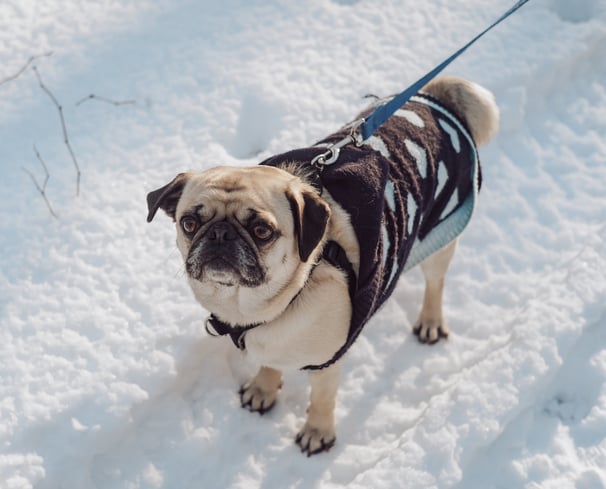Winter Pet Safety Tips
Updated on: July 29, 2024 | Author: Starwood Pet Travel

Winter is often associated with cold and flu season for humans, but it's important to remember that our furry friends can also be affected by the harsh conditions of Old Man Winter. To ensure the health and safety of your favorite feline or canine companion throughout the winter season, we have compiled some tips to help you prepare in advance.
Keep them warm and dry
Despite having a natural fur coat, pets are not immune to the cold, regardless of how much they may enjoy playing in the snow. Unless your pet belongs to a breed specifically adapted for extreme cold, such as a Malamute or Newfoundland, it is crucial to provide them with extra protection when temperatures drop.
While small dogs and those with short or thin coats are more susceptible, even larger dogs can suffer from frostbite and hypothermia if left outside for too long without proper protection. Frostbite can be incredibly painful, and hypothermia can be fatal. If you live in an area that experiences rainy but not excessively cold winters, investing in a pet poncho that can be easily unfurled around the neck when needed is a wise idea.
A well-fitted coat or sweater can cover most of your pet's body, but it's important to remember that their ears, nose, paws, and tail are still vulnerable to the cold. After your pet has been outside and potentially gotten wet or snowy, be sure to thoroughly dry them when they come back inside. Leaving their fur damp can lead to dry skin and other discomforts.
Protect their paws
Now, let's talk about those paws. Just like you wouldn't want to venture outside barefoot in freezing temperatures, your pets' paws need protection as well. While some dogs may tolerate wearing warm rain or snow booties, others may find them uncomfortable or refuse to cooperate. As for cats, well, they are unlikely to embrace the idea of becoming the next "Puss in Boots." Therefore, it is essential for you to take responsibility for safeguarding their bare paws.
Keep your pet away from areas where there might be antifreeze on the ground, such as your garage or driveway. Antifreeze has a sweet taste that can be tempting to lick, but even a tiny amount can be lethal. The same caution applies to certain commercial deicers and even salt, which can be harmful to your pet. Always make sure to rinse or wipe off their feet after they have been outdoors.
Watch out for dry skin
In addition to the cold, winter air can also dry out your pet's skin, just as it does to yours. While you can't smear them with lotion, there are a few things you can do to help combat this issue. Firstly, bathe your pet less frequently, as bathing can contribute to drying out their skin. Secondly, consider adding a salmon or coconut oil supplement to their diet to provide extra moisture. Lastly, you can purchase a special healing balm formulated specifically for pets and apply it to areas that appear red or scaly, such as their nose and paws. Alternatively, you can use coconut oil or make your own paw balm.
When it comes to outdoor activities, it's best to limit the time your pet spends outside as temperatures drop. Even if your cat is accustomed to going outdoors, it may be wise to keep them indoors during the winter months. Make potty breaks as short as possible, and keep playtime and walks brief, scheduling them for the warmest part of the day.
Maintain a heathy weight
Some pet owners believe that adding an extra layer of fat to their pet's body will provide them with extra protection from the cold. However, this is not a recommended practice. Even just a pound or two of excess weight can be unhealthy for your pet, depending on their size. If your dog or cat is less active during the winter, you may want to consider reducing their food intake. On the other hand, if they are your snowshoeing or skiing partner, they may require additional food to compensate for the increased physical activity. It's always best to consult with your veterinarian regarding your pet's specific needs.
With outdoor play opportunities potentially limited, you can combine feeding and exercise to keep your pet mentally and physically stimulated. Tossing kibble down the hall for your pup or kitty to chase, teaching your dog to catch pieces of food in midair, or using puzzle toys that require them to work for their meal are all great ways to achieve this.
Be prepared for emergencies
Lastly, it's important to check your emergency go-bag. As we have previously emphasized the importance of being prepared for natural disasters, it's crucial to have a pet first aid kit at home and a bag packed with essentials in case you need to evacuate quickly. During the winter, this go-bag can serve the dual purpose of ensuring you have the necessary provisions for your pet in case of being snowed in for a few days. Take the time now to ensure you have extra blankets, food, bottled water, and any medications your pet may require.
Photo by Marie-Michèle Bouchard on Unsplash
Subscribe to the Blog
Enjoy our content? Get them sent to your inbox!
Subscribe Now!

